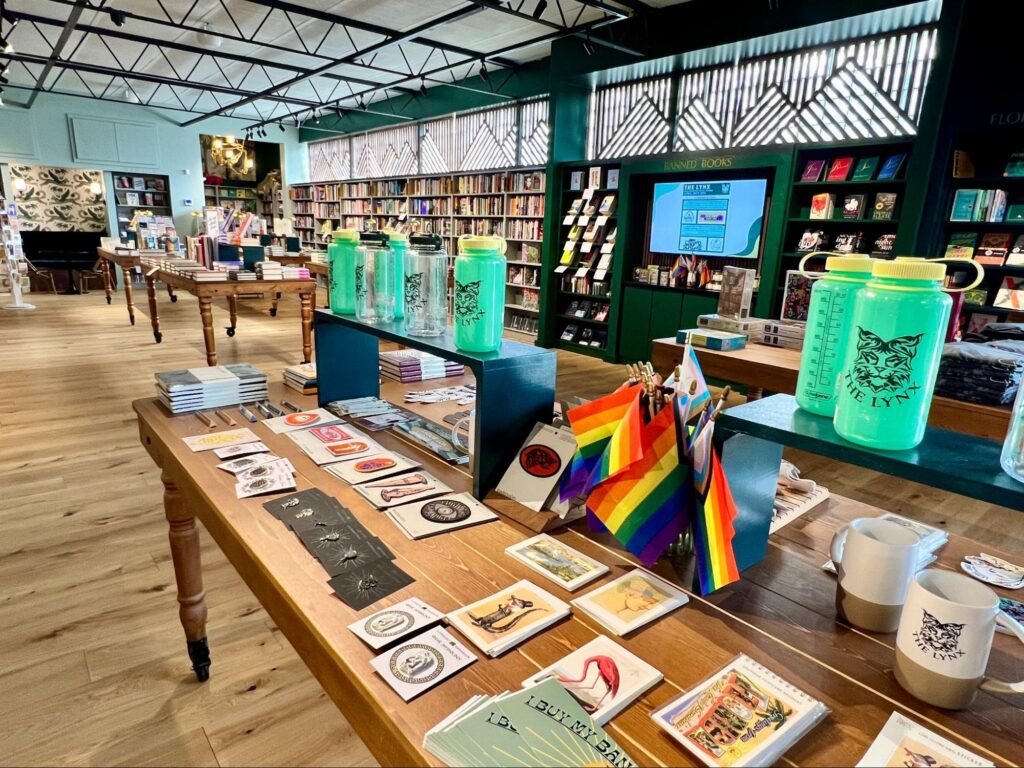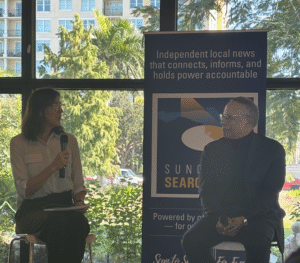This article is the third installment of “Reading between the Lines,” a series about how independent Florida bookstores navigate an increasingly divided world. Part two can be read here.
Three-time National Book Award finalist and The New York Times–bestselling author Lauren Groff was driving through Gainesville at night with her husband when something darted in front of their car. Groff described it as a “truly enormous housecat the size of my knees,” except it didn’t seem to have a tail.
At the time, the two were debating what they were going to name the bookstore they were planning to open. Later, when she looked up what the creature was that they encountered that night, Groff knew that she had her name.
Bobcats (Lynx rufus) are wildcats native to Florida’s forests and swamps. They’re about twice the size of a housecat and known for their hunting prowess and stealthiness—it’s rare to catch more than a quick glimpse of one in the wild. Groff wanted a bookstore and a community space that embodied this fierceness and Floridian spirit, but that also served as the beating heart, a “central nexus for diverse communities,” or a link.
The Lynx Books opened in Gainesville in April 2024 and aims to promote books that are banned in Florida, or that are otherwise written by Floridians, BIPOC authors and LGBTQ+ authors. A mural of a lounging bobcat on the building’s exterior faces the road, along with the phrase “Watch Us Bite Back.”
Groff had been living in Gainesville for 18 years with her husband, Clay Kallman, by the time they opened—her, an accomplished author whose most popular book, Fates and Furies, was former president Barack Obama’s favorite book of 2015, and him, member of the family that owned the Florida Book Store in Gainesville from 1933 until 2016.
Groff wanted a shop that could host large-scale community events and bring in authors from other parts of the country and the world, something other bookstores in Gainesville hadn’t been able to do before many of them closed.

The final catalyst for Groff and Kallman pursuing their dream of opening The Lynx Books came in 2023 during a fellowship in Germany with the American Academy in Berlin.
“That was when the gates opened and we started hearing about all of the book bans flooding through Florida,” Groff said. “German people kept pulling me to the side and saying, ‘Listen, you have to stop this now. It’s really, really urgent. This is the first part of an authoritarian purge. And if you don’t take a stand now, you’ll be complicit.’”
Groff’s own Fates and Furies was banned from libraries and classrooms in Miami-Dade County in 2023, and in Walton County in 2022 according to PEN America’s Index of School Book Bans.
Since 2022, Florida has adopted several laws that have made banning books a straightforward process, with a long road ahead to have those books reinstated. Those laws include:
- HB 1467 (2022) — requires that all classroom and library materials in public schools be posted publicly online, and facilitates challenges from parents and residents to remove books they object to.
- HB 1557 (2022), “Don’t Say Gay” — banned instruction related to gender identity and sexual orientation from kindergarten through grade three, which included language such as “Sally has two moms or Johnny has two dads.” This law has since reached a settlement that continues to ban instruction, but explicitly allows for discussion of these topics in schools.
- HB 1069 (2023) — mandates that “depicts or describes sexual content” is a valid reason for a book to be challenged, and that it must be immediately pulled from shelves pending review. Also expanded the provisions of “Don’t Say Gay” through grade eight, which the Florida Department of Education later expanded through grade twelve.
One other bill that was introduced in 2025, HB 1539, attempted to make it so that once a book was removed from shelves, its “literary, artistic, political or scientific value” could not be considered as a reason to return it. HB 1539 did not pass into law.
Legislation like this can impact the educational opportunities afforded to Florida students, but it also serves to give Florida a specific reputation. At its most lighthearted, “they all think of us as the ‘Florida Man’ state, they think of us as the punchline to a joke,” Groff said. But it also contributes to a reputation of Florida as an anti-education and anti-human rights state.
Groff described visiting other bookstores across the country, only to be met with the question of, “Why Florida?”
“People make faces because they do think of Florida as being deeply anti-intellectual,” she elaborated. “And that comes not out of the people of Florida, that comes out of the politicians in Florida who have made a stance in being anti-intellectual, in limiting the freedom to read, in limiting the effectiveness of our schools and having government overreach into the educational system.”

This can make bringing in authors from outside Florida for local events a struggle.
“We have tried so hard to get transgender authors to the store,” Groff said.” “Every large transgender author that you can possibly imagine. Nobody wants to come, and I do not blame them in the slightest. This is the most hostile state for transgender people, and we push their books as hard as we possibly can because we love them and we want to support their lives and their dignity and their respect.
“It’s understandable right now, because this does not seem [like] a hospitable state,” she continued. “I have to say, it’s not the people. The people are good people here. It is the politicians.”
Behind the fear and trepidation, Groff emphasizes the rich “literary life of Florida”—Zora Neale Hurston, Marjorie Kinnan Rawlings, Ernest Hemingway, Marjorie Stoneman Douglas, Harry Eugene Crews and Wallace Stevens are just a few of the authors who were born in, lived in or wrote regularly about Florida that Groff named who made her love the state when from upstate New York.
The Lynx Books cultivates that same love of Florida and love of literature through its First Editions Club, a subscription-based club where members receive a signed, first-edition hardcover book selected by Groff and her staff. Members also receive discounted tickets or early access to events with authors.
Some of those events include book launches and conversations with authors such as Florida authors Karen Russell, Laura van den Berg, Kristen Arnett, Jack Davis and Cynthia Barnett. Other authors that The Lynx has drawn in from outside Florida in the past year include Katie Kitamura, Laila Lalami, Jess Walter, Emma Donahue and more.
Staff of The Lynx also host myriad book clubs, from Science Fiction & Fantasy to Classics, to Florida Literature to Banned Books. A Health & Spirituality book club is in development with a Gainesville therapist, and the Cook Book Club doubles as a potluck.

But it’s one thing to hold events that promote literacy and community togetherness. What about putting books in the hands of some of society’s most vulnerable, disenfranchised people?
Homelessness affects hundreds of thousands of Floridians, and is made worse by scorching temperatures and legislation that makes existing while homeless exponentially difficult. The GRACE Marketplace, Gainesville’s one-stop homeless shelter, often has up to 140 people living there at all times, according to Groff.
The Lynx Books is a for-profit business, and somewhat limited in what it can do to help. So Groff also founded The Lynx Watch, Inc., the bookstore’s nonprofit counterpart which has, in its first year, given away $40,000 worth of banned books. The latest initiative from The Lynx Watch, Inc. is to build a banned book free library in the GRACE Marketplace.
“It’s a giant room, so it’s going to be many thousands of banned books that we are going to put in there,” Groff said. “We believe, very profoundly, in the dignity of all human beings, and we believe that our unhoused friends and neighbors deserve as much beauty and literature in the world that they can possibly get.”

Lauren Groff’s Book Recommendations
The Dream Hotel is the latest novel and National Bestseller by Laila Lalami, a recent guest at The Lynx Books. A fictional dystopian thriller, the book follows Sara as she is apprehended by the Risk Assessment Administration, who determine that—based on data they’ve collected from her dreams—she will soon commit a crime. Sara is placed under observation at a retention center along with a group of women all attempting to prove their innocence for crimes they haven’t committed… yet. The Dream Hotel asks urgent questions about surveillance, privacy, incarceration and our rapidly developing technological world.
On the Calculation of Volume by Solvej Balle is a multiple-award winning Danish seven-part series, with five books currently written and two books translated into English by Barbara J. Haveland. Book I in the series introduces us to the world of protagonist Tara Selter, who is stuck in a time loop and has repeated the same day 122 times. Groff was hesitant to reveal any other details about the book and urged readers to explore it for themselves.
“It’s a very hyper-literary groundhog day that keeps getting weirder and more interesting,” Groff said. “It’s about time and art and love, and it’s just extraordinary.”




